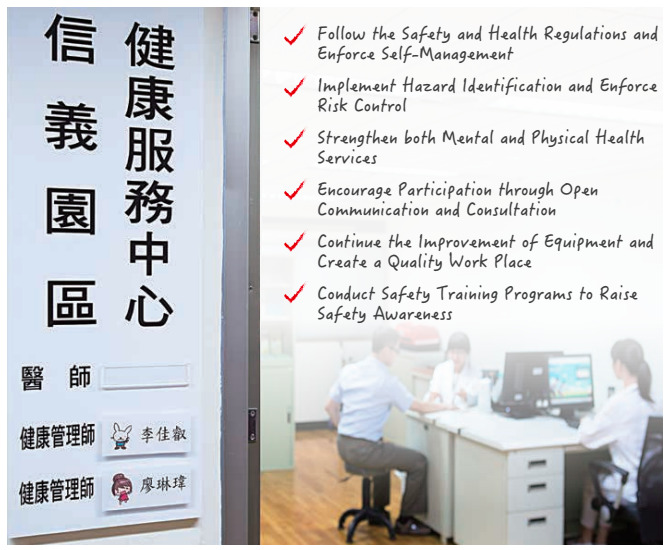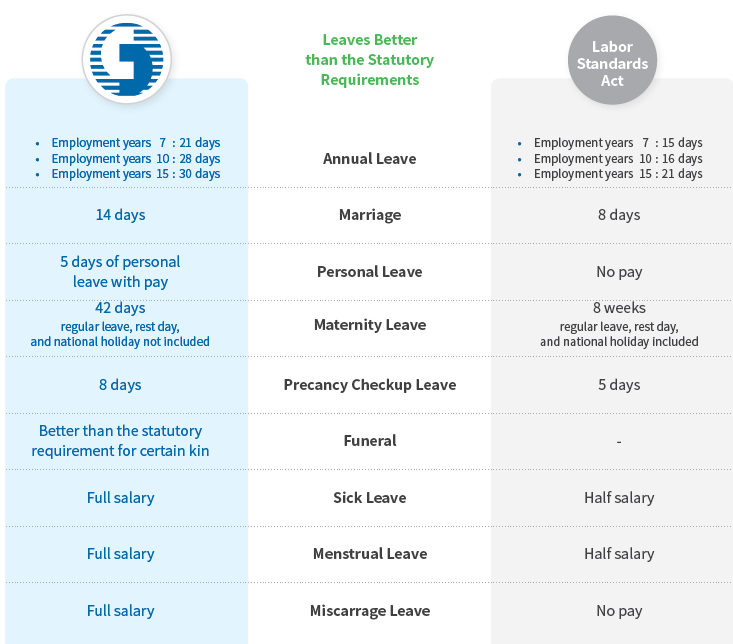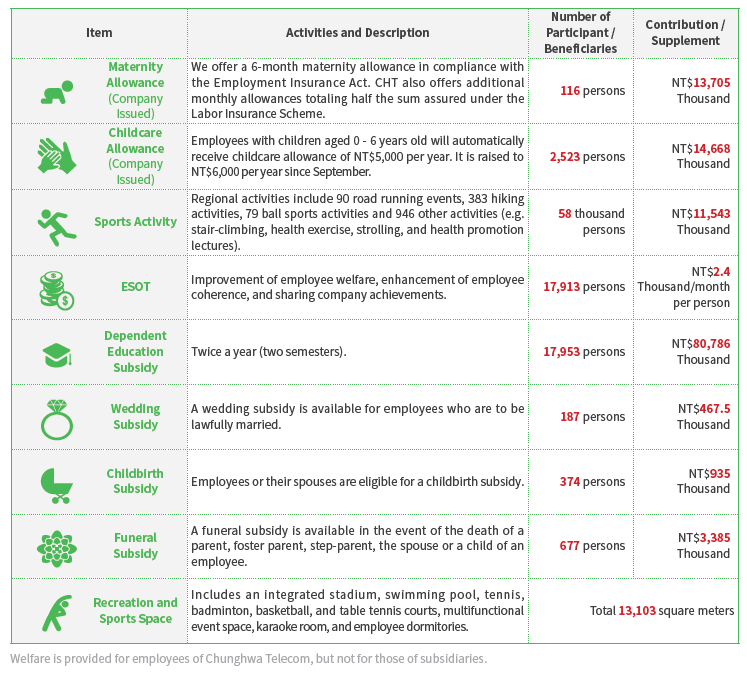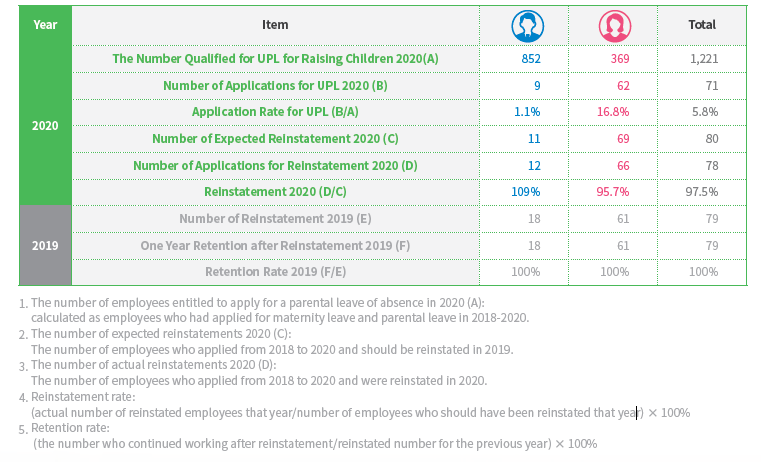Happy Workplace
Employees' Safety, Health and Wellbeing
Chunghwa Telecom was the first telecom service provider in Taiwan to adopt the OHSAS 18000 Occupational Health and Safety Management System. In response to the renaming ops and migration from OHSAS 18001 to ISO 45001, as of the end of 2020, the total of 26 branches completed the certification of ISO 45001. It is scheduled to complete the migration to ISO 45001 certification throughout the branches by 2021. In addition to identifying hazards and assessing the risks associated with telecom operations, the Company has also applied restrictions and enhanced risk control for high-risk tasks, while taking effective precautions to reduce occupational hazards. In addition to complying with safety and health regulations, the Company has also been active in the improvement of the current work environment and takes regular action with regard to safety and health facilities and measures.
There is Labor Safety and Health Committee in institutions at all levels in CHT, the average proportion of labor representatives is 35.64%. Meetings are held quarterly to deliberate, coordinate and make suggestions on labor safety and health issues. There is also Labor Safety and Health Department, which is responsible for the planning and implementation of labor safety and health matters.
The head office’s Labor Safety and Health Committee has 29 members, 10 members are from the labor union, accounting for 34%. 4 meetings were held in 2020 and 8 proposals were presented by the labor representatives, 6 were related to the refinement of safety and health management, and 2 were related to employee benefits. All of the above are solved.

Chunghwa Telecom believes employees’ health as company’s fortune. Providing a safe and healthy workplace is the basic requirement of corporate social responsibility. CHT offers employees flexible working hour mechanism. Different from the conventional fixed working hours, on the basis of same working hours per day, employees can choose to come to office in 8:00-9:00 and flexibly adjust their working schedule (move up or postpone) catered to their needs as long as employees finish the jobs allocated.
Chunghwa Telecom GRI 403 Occupational Health and Safety Disclosure.PDF
Full-Time Physicians and Nurses to Improve Employee’s Health Management
To better provide immediate medical assistance and attend to worker health, we engaged 22 full-time nurses and contracted 20 physicians in 2020 for this specific purpose. Also, we set up health service centers at ten locations, including the Xinyi Campus (Yilan and Hualien included), Aiguo Campus, Daan Campus (Keelung included), Guoguang Campus (TTI included), Taoyuan Branch, CHT-TL (Hsinchu and Miaoli included), Taichung Branch, Taichung Branch of the Mobile Business Group (Nantou included), Changhua Branch (Yunlin included), as well as Linsen Campus (Pingtung and Taitung included), offering health services, consultation, and care.
The contracted doctors help with the on-site inspection at the offices, offering advices in line with human factors engineering for employees that uses computers at work, and adjust the heights of computers and chairs. The procurement of office equipment, besides in conformity to “the materials technical specifications” of the Company, are in compliance with the National Standards of the Republic of China (CNS). Also, we conduct monitoring and keep records of the temperature, humidity, illuminance, indoor air quality (CO2) in the working environments of our employees in order to ensure the comfortability and safety of working environments. All the monitoring results in 2020 were in line with the regulations.
CHT has deployed 6 i-med Systems at local customer centers for employees involved in high-risk activities. Blood pressure is measured and employees are given careful health checks before they engage in any high-risk work. Also, we deployed 10 sets of workplace health management physiological (blood pressure) measurement system in the facilities. Combined with our “Enterprise Healthcare System (EHS) and Personal Health Record”, our employees can monitor the changes in their blood pressure anytime.

Health Promotions for Senior Employees
Health checkups: The Company provided checkup services specifically targeted at senior employees, including carotid duplex and echocardiography for the risk of ischemic stroke, coronary artery narrowing and incomplete heart valve closure, as well as fundus photography for checking macular degeneration, retinal vessels and glaucoma.
Flexible Working Hours
CHT offers employees flexible working hour mechanism. Different from the conventional fixed working hours, on the basis of same working hours per day, employees can choose to come to office in 8:00-9:00 and flexibly adjust their working schedule (move up or postpone) catered to their needs as long as employees finish the jobs allocated.
Having formulated “Chunghwa Telecom Directions Governing Flexible Working Hours System and Working from Home” for research units/innovation incubation center for personnel to adopt diverse flexible working hours, CHT arranged the flexible working hours as 06:30-10:30 for clock-in and 15:00-19:00 for clock-off.
Work from Home Arrangements
In response to employees’ work requirement in the digital era and the global outbreak of COVID-19, CHT established the system of Working from Home, created a mobile operating environment, and set up digital tools to help its employees to work remotely. Any employee that fits for WFH can submit application in line with their business needs before accessing the CHTNet corporate network for working remotely.
The internal corporate network created by CHT is protected by high-level information security mechanism that allows safe access of internal resources. In addition to WFH employees, employees of mobile operation and corporate managers on business trip can access to the corporate internal network for document viewing and approval as well as emergency handling.
Work-family Balance
1. CHT offers well-rounded care mechanism to employees from single to family and having baby with matchmaking before marriage, group wedding, and maternity allowance.
2. For unwed employees, matchmaking events are organized regularly. Also, CHT funds regularly large group weeding activities. Group weddings were organized in 11 years for 550 couples while CHT provided wedding gifts of NT$20,000 worth.
3. “Unpaid parental leave”, “family care leave”, “paternity leave”, etc. are available. Also, “breastfeeding rooms” are established in the working environment.
CHT has launch sound initiatives to assist our employees juggle between work and family, including:
1. Maternity leave:
We have been implementing an unpaid childcare leave system since 2006 to help employees juggle their attention between work and family. Chunghwa Telecom is required, under the Employment Insurance Act, to pay a six months maternity allowance to employees who give birth. Female employees who have taken this leave are further entitled, under company policy, to receive an additional monthly allowance of half the sum assured under the Labor Insurance Scheme during child-care leave, for a period up to two years. Employees of Chunghwa Telecom are also entitled to other privileges such as family care leave, paternity leave, menstrual leave, and a nursery room service, as well as epidemic prevention childcare leave pursuant to the government’s epidemic prevention policy. In 2020, 71 employees applied for unpaid child-care leave; 116 employees applied for child-care leave allowances. NT$ 13,705 thousand was paid out as child-care leave allowances.
The laws pertaining to maternity leave in Taiwan:
1. A total of 56 calendar days in succession for maternity leave.
2. 100% salary amount dispersed to employees in service for 6 months or above.
3. 50% of salary amount dispersed to employees in service under 6 months without affecting the full attendance thereof.
CHT employee maternity leave is better than that stated in the laws of Taiwan:
1. Up to 62 calendar days in succession for maternity leave (6 more days than that stated in the laws).
2. 100% salary pay, disregard the service duration of employees, not affecting the full attendance thereof.
The pregnancy checkup leaves for employees in the laws of Taiwan: 5 days
The pregnancy checkup leave for CHT employees exceeds that in the laws of Taiwan: 8 days
2. Paternity leave:
CHT provides five-days paternity leave for employees due to their spouse's childbirth, and can apply for a sub-division.
3. Childcare facilities and contributions:
(1) Employee in service with child at 0-6 year(s) old is provided with a NT$6,000 childcare allowance per year.
(2) Contract with quality local childcare facilities offers employees discounts on the childcare service fees. 35 dedicated staff with budgets totaled NT$145 million were allocated, benefiting employees with 25,224 usages thereby.
(3) Children of CHT employees are supported with 4 to 12 times of education expense subsidies, totally NT$35,800.
(4) The public child education and care services were promoted in 2020 with childcare facilities for 15 classes established, which are expected to inaugurate officially in 2022.
(5) The allowance for unpaid parental leave for raising children for employees in the laws of Taiwan: no more allowance since the 7th month onward.
The allowance for unpaid parental leave for raising children for CHT employees exceeds that in the laws of Taiwan: starting from the 7th month to 24th month with an average of 50% of the insured salary.
Ensuring Employees’ Happiness
Protecting the Rights of Workers
Chunghwa Telecom treats employees as their most important business partners. To ensure the best protection for the work rights of the employees, Chunghwa Telecom signs an “Employment Contract” with each employee and undertakes to notify them of any changes in terms of employment in compliance with the Labor Standards Act. Furthermore, CHT uses several different channels, including seminars and labor-management meetings, to maintain harmony and a mutually beneficial working relationship with employees.
Building a Happy Business
CHT regards employees as important assets. We offer a commitment to our employees refrain from making layoffs and salary reductions. This means employees can devote themselves fully to boosting performance at work to create more value for themselves and the Company. In response to the government’s policy to boost birth rates, CHT is providing childcare subsidies and maternity benefits to young employees with children aged 0-6 years old. We are committed to building through software and hardware resources, expecting to set up workplace childcare support centers in Taipei City, New Taipei City, Taoyuan City, Taichung City, Tainan City, and Kaohsiung City that are scheduled to open in August 2022 to provide education and care services for the children and grandchildren of employees and create a friendly workplace, so that employees can be confident in their work, creating higher value for individuals and businesses, and build a he althy and secure business.


Better Maternity Benefits than the Legal Requisites
We have been implementing an unpaid childcare leave system since 2006 to help employees juggle their attention between work and family. The employees who have taken childcare leave are entitled to receive a six months maternity allowance from the authority under the Employment Insurance Act. While six months expiry, the Company will further pay an additional childcare-subsidy of half assurance sum of Labor Insurance Scheme according to its policy. Employees of Chunghwa Telecom are also entitled to other privileges such as family care leave, paternity leave, menstrual leave, and a nursery room service, as well as epidemic prevention childcare leave pursuant to the government’s epidemic prevention policy. In 2020, 71 employees applied for unpaid child-care leave; 116 employees applied for child-care leave allowances. NT$13,705 thousand was paid out as child-care leave allowances.

Retirement Benefits
Employee requests for retirement are processed in accordance with the Chunghwa Telecom Employee Retirement Pension and Separation Guidelines, the Labor Standards Act, and the Labor Pensions Act.
The Labor Standards Act: The Company makes monthly pension contributions of up to 15% of an employees’ monthly salary to the pension fund. This fund is held under the auspices of the Labor Pension Supervisory Committee. The current balance of the pension fund account is 39.2 billion.
The Labor Pension Act: The Company makes monthly contributions of no less than 6% of an employees monthly salary. These contributions are deposited in the employees pension account held by the Bureau of Labor Insurance of the Ministry of Labor, in accordance with the Contribution Rate Sheet approved by the Executive Yuan.
Monthly pension contributions were made in accordance with the Monthly Contribution Wages Classification Scheme published by the Ministry of Labor, subject to biannual adjustments.
Lifelong Learning and Training Programs
To help our employees to adapt and create quality lives after retirement, Chunghwa Telecom Training Institute was commissioned to organize “Care Program for Retirees’ Sweet, Happy Lives”. A total of 12 sessions were organized with 748 person-times involved in 2020. Also, we continued to contribute to “Chunghwa Telecom Retirees Association” with an amount of NT$4.5 million to support them to organize relevant activities. We also donated NT$1.5 million for travel activities and NT$300,000 for the meal expenses of all volunteers across branches during the Lunar New Year.
To help facilitate the transfer of knowledge and experience, we have stipulated “Consultant Recruitment Guidelines” to hire paid consultants and honorary consultants. Managers at a position of Senior Executive Vice President or above, or the head of Level-1 institutions, may be hired by Chunghwa Telecom as paid consultants after retirement. Paid consultants shall serve a term of no more than one year, and assume honorary consultants upon the day after one-year period has expired.

